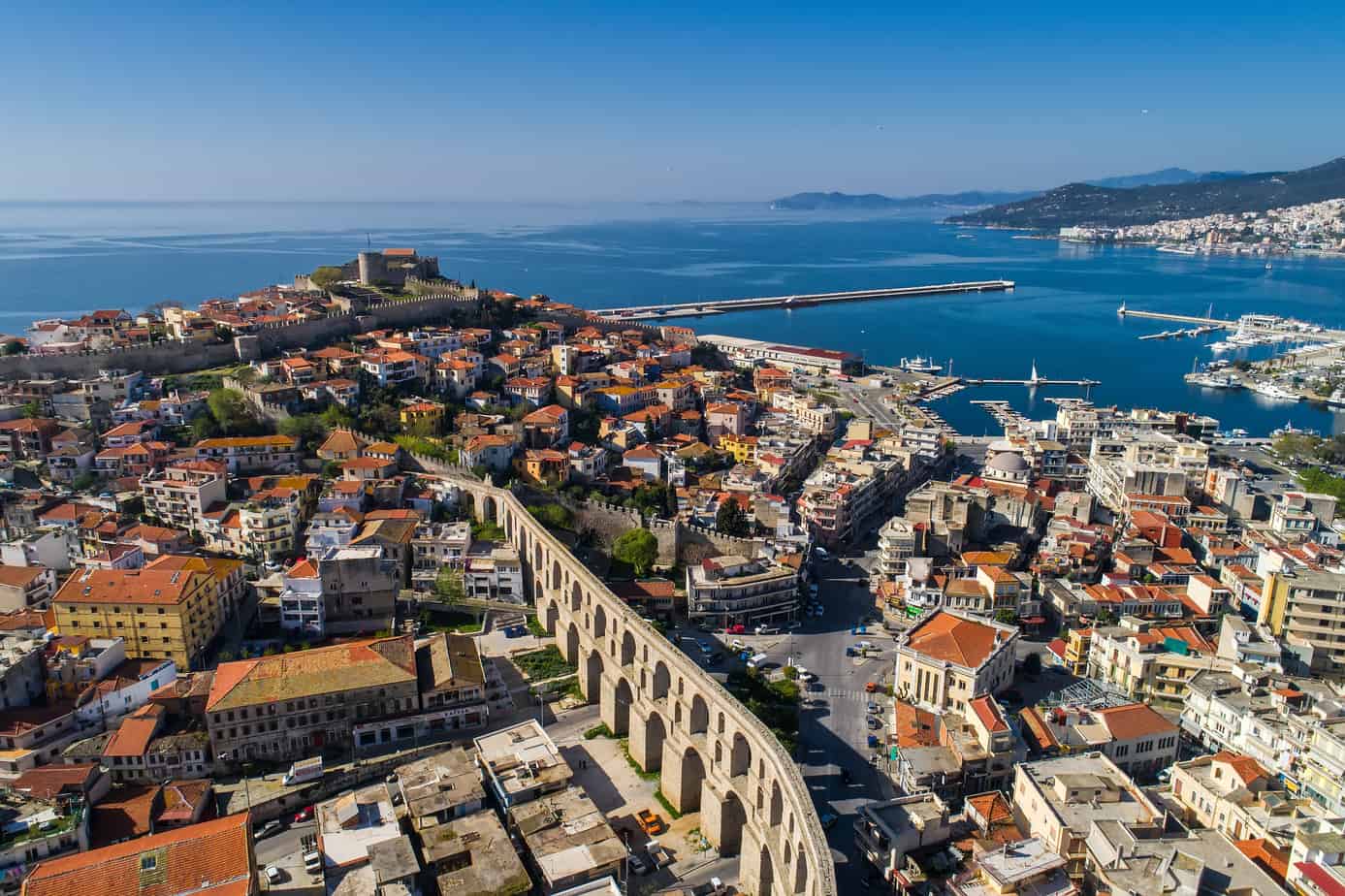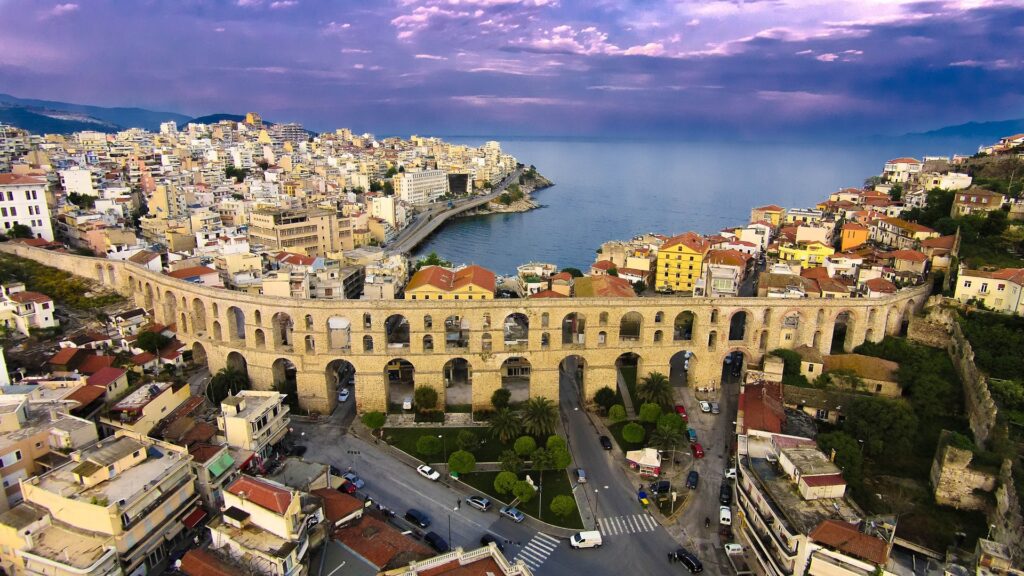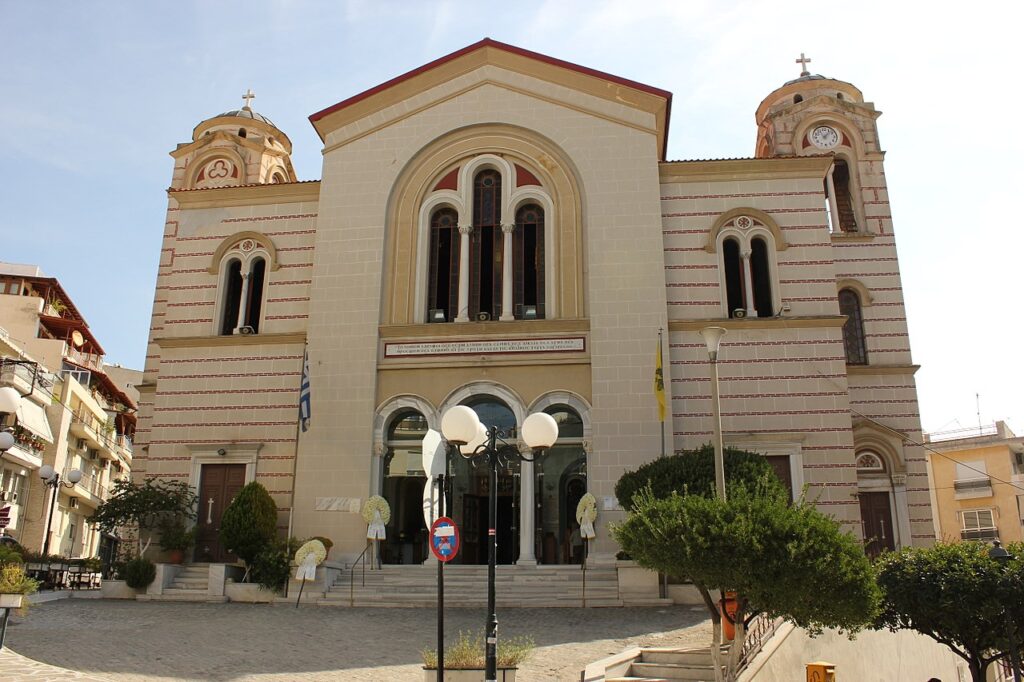Kavala is an important economic centre of Northern Greece, a center of commerce, tourism, fishing and oil-related activities, and formerly a thriving trade in tobacco.
Kavala is a city in northern Greece, the principal seaport of eastern Macedonia and the capital of Kavala regional unit.
It is situated on the Bay of Kavala, across from the island of Thasos and on the Egnatia motorway, a one-and-a-half-hour drive to Thessaloniki (160 kilometres (99 miles) west) and a forty-minute drive to Drama (37 km (23 miles) north) and Xanthi (56 km (35 miles) east). It is also about 150 kilometers west of Alexandroupoli.
Education and research
- The International Hellenic University (IHU; Greek: Διεθνές Πανεπιστήμιο της Ελλάδος) has five departments in Kavala (Computer Science, Physics, Chemistry, Management Science and Technology, Accounting and Information Systems). The campus of the institute located in St. Lukas, Kavala and is approximately 132,000 m2 with buildings covering an area of 36,000 m2.
- MSc in Management and Information Systems
- Fisheries Research Institute (FRI) is one of the five specialized research institutes of N.AG.RE.F, being responsible to conduct research and to promote technological development in the fishery sector. The institute is located 17 km (11 mi) from Kavala, in Nea Peramos, at the center of a marine area with rich fishery grounds and high biodiversity in the surrounding lagoons, lakes, and rivers.
- Institute of Mohamed Ali for the Research of the Eastern Tradition (IMARET) is a registered NGO with the Hellenic Ministry of Foreign Affairs, which was established by concerned citizens in Kavala. Its aims include the study of the Egyptian influence in Greece and vice versa. The intra-cultural exchange and dialogue, as well as the promotion of art as a means of intra-cultural understanding. The first major co-operation partner is Cultnat of Bibliotheca Alexandrina with the aim of documenting and digitizing the architectural heritage of the Mohamed Ali era in Egypt and Greece. The most important event that takes place every year at the institute is the International Roman Law Moot Court Competition.
- Historical & Literary Archives of Kavala is a non-profiteering, public utility foundation. Its foundation was not subsidized by the Greek State, either by any other enterprise of the private sector. Its operational cost is covered only by its founders and by infrequent aids of the local self-government.
- Egnatia Aviation is a private training college for pilots that started training in Greece in July 2006. The facilities of Egnatia Aviation are mostly located in the former passengers’ terminal of the Kavala International Airport “Alexander the Great”.
Culture
Festivals and events
Kavala hosts a wide array of cultural events, which mostly take place during the summer months. One of the top festivals is the Festival of Philippi which lasts from July to September and includes theatrical performances and music concerts. Since 1957, it has been the city’s most important cultural event and one of the most important of Greece.
Kavala AirSea Show is also an annual air show held in late June.
“Cosmopolis” is an international festival held in the Old Town of Kavala that offers an acquaintance with cultures around the world through dancing and musical groups, traditional national cuisines, cinema, and exhibits at the kiosks of participant countries. The first festival took place in 2000, and from 2002 until 2009 was organized annually. It was revived in 2016 with a participation of 250 artists and musicians from all over the world.
Yiannis Papaioannou‘s Festival includes concerts and music seminars.
“Ilios kai Petra” (Sun and Stone) (July) is a festival held in “Akontisma” of Nea Karvali. The event is of folkloric character, with the participation of traditional dancing groups from all over the world.
Wood Water Wild Festival is an outdoor activities festival, inspired by nature. It includes live bands and DJ sets, body&mind activities, a book fair, outdoor theatre, ecology, camping, and debates.
Various cultural events are held in all municipalities of Kavala during the summer months.
In popular culture
- In 1934 Mitsos Partsalidis was elected mayor of Kavala, the first communist mayor in modern Greek history. The city gained temporarily by the press, the nickname “little Moscow”.
- Among movies shot in the city is Topkapi (1964), partially shot in Kavala.
Cuisine
Fish and seafood, as well as the products of the local livestock breeding and agricultural sectors, are the prevailing elements of Kavala cuisine. In Kavala, the traditional local recipes have been also influenced by the cuisine of the refugees from Pontus and Asia Minor.
Fresh fish and seafood, especially sardines, shrimp salad (garidosalata), mackerel “goúna” (sun-dried mackerel on the grill), kavouropilafo, mussels with rice, herring saganáki, anchovies wrapped in grape leaves, stuffed eggplants and from meat plates, lamb with spinach, are some renowned recipes in Kavala and the coastal settlements of the region. The grapes, wine, and tsipouro produced in the area, as well as the kourabiedes (sugar-coated almond biscuits) from Nea Karvali, are particularly famous.
Economy
Traditionally the primary occupation of the population of Kavala was fishing. The fishermen of the town were well known all over northern Greece.
After the country’s industrialization, Kavala also became a center of the tobacco industry in northern Greece. The building of the Municipal Tobacco Warehouse (1910) still stands today.
Oil deposits were found outside the city in the 1970s and are currently exploited by two oil rigs (Prinos and Epsilon).





